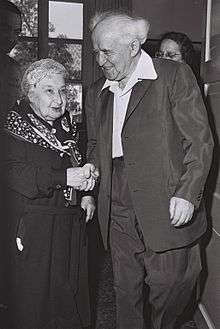Angelica Balabanoff
| Angelica Balabanoff Russian: Анжелика Балабанова | |
|---|---|
 Angelica Balabanoff visiting David Ben Gurion in Tel Aviv, 1962 | |
| Born |
August 4, 1878 Chernihiv, Ukraine |
| Died |
November 25, 1965 (aged 87) Rome, Italy |
| Other names | Angelica Balabanov, Angelica Balabanova, Anželika Balabanova |
| Occupation | Italian politician, activist, secretary of the Comintern |
Angelica Balabanoff (or Balabanov, Balabanova; Russian: Анжелика Балабанова – Anzhelika Balabanova; 4 August 1878[1] – 25 November 1965) was a Russian-Jewish-Italian communist and social democratic activist. She served as secretary of the Comintern and later became a political party leader in Italy.
Biography
Balabanoff was born into a wealthy family in Chernihiv, Russian Empire, where she rebelled against her mother's strictness.[2][3] While attending the Université Libre de Bruxelles in Brussels, Belgium, she was exposed to political radicalism. After her graduation with degrees in philosophy and literature, she settled in Rome and began to organize immigrant workers in the textile industry, joining the Partito Socialista Italiano (Italian Socialist Party, which she later became the leader of) in 1900. She became closely associated with Antonio Labriola, Giacinto Menotti Serrati, Benito Mussolini, and Filippo Turati (the founder of the Italian Socialist Party).

She moved further to the left during the First World War, becoming active in the Zimmerwald Movement. During the war, she spent some time in exile in neutral Sweden, where she was affiliated with the Left Socialist movement and became a close friend of the Swedish Communist leaders Ture Nerman, Fredrik Ström, Zeth Höglund and Kata Dalström.
When the Russian Revolution broke out in 1917, Balabanoff joined the Bolshevik Party and travelled to Russia. According to Emma Goldman, she became disillusioned with the style of socialism in Russia and "[she] had become rooted in the soil of Italy."[4] Balabanoff told Goldman of her discomfort about temporarily living in the Narishkin Palace.[4] She became secretary of the Communist Third International in 1919 and worked alongside Vladimir Lenin, Leon Trotsky, Grigory Zinoviev, and Emma Goldman, as well as many others. She became an open critic of Bolshevism and left Russia in 1922, travelling back to Italy and joining with Giacinto Menotti Serrati. After Serrati left to rejoin the Communists, she led his Maximalist group until the rise of Fascism forced her into exile in Switzerland, where she edited Avanti! and became the secretary of the Paris Bureau. She moved to Paris, then New York City at the outbreak of the Second World War. When the war ended, she returned to Italy and joined the Socialist Workers' Party, which became the Italian Democratic Socialist Party (after including the United Socialist Party).
Legacy
Balabanoff is a major character in the 1993 RAI Italian language production "Il Giovane Mussolini", portrayed by Susanne Lothar.
Balabanoff is memorialized in Judy Chicago's The Dinner Party.[5]
Works
- Il vostro Dovere in tempo di Elezioni: Alle Proletarie (Your Duty in Time of Elections: to the Proletarian Women). Lugano: Cooperativa Tipografica Sociale, 1904.
- Neskol'ko slov ob agitatsii: Pis'mo-lektsiia (A Few Words on Agitation: Correspondence Lecture). Moscow: Gosudarstvennoe Izdatel'stvo, 1920.
- Ot rabstva k svobode: Obiazannosti i prava kommunistov v pervoi trudovoi respublike (From Slavery to Freedom: Duties and Rights of Communists in the First Laborers' Republic). Moscow: Gosudarstvennoe Izdatel'stvo, 1920.
- Svetloi pamiati Iakova Mikhailovicha Sverdlova. (To the Blessed Memory of Iakov Mikhailovich Sverdlov). Moscow: Gosudarstvennoe Izdatel'stvo, 1920.
- Iz lichnykh vospominanii Tsimmerval'dtsa (from the Personal Reminiscences of the Zimmerwaldists). Leningrad-Moscow: Izdatel'stvo "Kniga," 1925.
- Erziehung der Massen zum Marxismus: Psychologisch-pädagogische Betrachtungen (Educating the Masses to Marxism: Psychological-Pedagogical Considerations). Berlin: Laub, 1927.
- Marx und Engels als Freidenker in ihren Schriften (Marx and Engels as Free-Thinkers in their Writings). Berlin: Der Freidenker, 1930.
- Sozialismus als Weltanschauung (Socialism as a Worldview). Berlin: Dt. Freidenkerverband, c. 1932.
- Caduti per noi, caduti per voi (Fallen for Us, Fallen for You). New York: Edizione "La Fiaccola," c. 1935.
- My Life as a Rebel. London: Hamish Hamilton, 1938.
- Traitor: Benito Mussolini and his "Conquest" of Power. New York: G. Popolizio, c. 1942.
- Tears. Chicago: Jay Bass, 1943.
- Impressions of Lenin. Isotta Cesari, trans. Ann Arbor, University of Michigan Press, 1964.
References
- ↑ "Anželika Balabanova Papers". IISG.nl. International Institute of Social History. Retrieved 15 February 2012.
- ↑ Elena Dundovich. "Angelica Balabanoff". RussInItalia.it (in Italian). International Agency for Russian-Italian Research.
- ↑ Shachtman, Max (November 1938). "Balabanoff's Memoirs". The New International. Socialist Workers Party. 4 (11): 348–350. Retrieved 15 February 2012.
- 1 2 Goldman, Emma (1923). "Chapter 13: Joining the Museum of the Revolution". My Disillusionment in Russia. Doubleday, Page and Company. ISBN 978-1-4191-3601-6. Retrieved 15 February 2012.
- ↑ "Angelica Balbanoff". The Dinner Party: Heritage Floor. Brooklyn Museum. Retrieved 4 June 2012.
External links
- Angelica Balabanoff, Russians in Italy, russinitalia.it
- Angelica Balabanoff Internet Archive, Marxists Internet Archive, www.marxists.org
- Uomini di Pace
- Ricordo di Angelica Balabanoff di Aldo Chiarle
- Angelica Balabanoff Papers at the Vassar College Archives and Special Collections Library